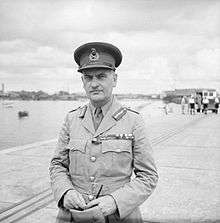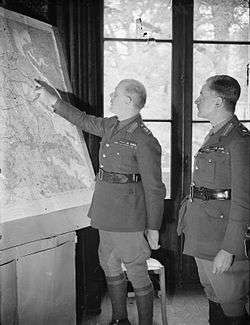Henry Pownall
| Sir Henry Pownall | |
|---|---|
 Lieutenant General Sir Henry Pownall | |
| Birth name | Henry Royds Pownall |
| Born | 19 November 1887 |
| Died | 10 June 1961 (aged 73) |
| Allegiance |
|
| Service/branch |
|
| Years of service | 1906–1945 |
| Rank | Lieutenant-General |
| Commands held |
Persia and Iraq Command Commander-in-Chief, Ceylon Far East Command |
| Battles/wars |
First World War Second World War |
| Awards |
Knight Commander of the Order of the Bath Knight Commander of the Order of the British Empire Distinguished Service Order & Bar Mentioned in Despatches |
Lieutenant-General Sir Henry Royds Pownall, KCB, KBE, DSO & Bar (19 November 1887 – 10 June 1961) was a senior British Army officer who held several important command and staff appointments during the Second World War. In particular, he was Chief of Staff to the British Expeditionary Force (BEF) in France and Belgium until the fall of France in May 1940. He was later Chief of Staff to General Archibald Wavell until the fall of Singapore in 1942, and Chief of Staff to Lord Louis Mountbatten in 1943–44.
Early career
Pownall was born on 19 November 1887[1] and received his education at Rugby School and Royal Military Academy, Woolwich. After graduating he began his military service with the Royal Field Artillery and Royal Horse Artillery, during which he was stationed in both Britain and India 1906–1914. In 1909 he was promoted to lieutenant, and then captain in 1914.
First World War
During the First World War, Pownall served in both France and Belgium. He was promoted to major in 1917 and oversaw the Royal Artillery, 17th Division. For his service during the war Pownall was awarded the Distinguished Service Order in 1918.
Interbellum
Following the war, Pownall served as Brigade Major at the School of Artillery in Larkhill from 1924 to 1925. He continued his training and education as General Staff Officer (Grade 2) at the Staff College, Camberley from 1926 to 1929 where he became a brevet lieutenant-colonel in 1928. After completing his training at Staff College he took part in Great Game operations in the North West Frontier of India through 1931.
Following this, Pownall held a series of staff appointments, serving as the Military Assistant Secretary for the Committee of Imperial Defence from 1933 to 1935, then as Deputy Secretary for the Committee of Imperial Defence in 1936. From 1936 to 1938, he was Commandant of the Royal School of Artillery. As the threat of war grew, he was Director of Military Operations and Intelligence in the War Office from 1938 to 1939.
Second World War
Britain entered the war after Germany invaded Poland on 1 September 1939. Pownall held a series of command and senior staff positions throughout the war. He was appointed Chief of General Staff for the British Expeditionary Force (BEF) in France and Belgium until the fall of France in May 1940. He then assumed the position of Inspector General for the recently created Home Guard and was Commander of British Troops in Northern Ireland, before being appointed the Vice Chief of the Imperial General Staff in the War Office in 1941.
He subsequently became Commander-in-Chief of the British Far East Command in South East Asia until 1942 when it was succeeded by the short-lived ABDACOM where he became Chief of Staff to General Sir Archibald Wavell. Afterwards he assumed the role of Commander-in-Chief, Ceylon from 1942 to 1943, and Commander-in-Chief of the Persia and Iraq theatres in 1943. Finally, he was appointed Chief of Staff to Vice Admiral Louis Mountbatten, the Supreme Commander of the Allied South East Asia Command from 1943 to 1944. After the conclusion of the war he retired from the British army in 1945.[2]
During the war Pownall received the distinctions of Knight Commander of the Order of the British Empire in 1940 and Knight Commander of the Order of the Bath in 1945.
He married Mary Henderson in 1918, whose husband John Gray had been killed in action in 1916, and was stepfather to her son, Willoughby Gray. Pownall died on 10 June 1961, aged 73.[3]
Post war positions
- Chairman, Friary Meux Limited
- Member of the Committee of Lloyds Bank
- Chief Commissioner, St. John Ambulance Brigade, 1947–1949
- Military consultant to Winston Churchill on the The Second World War (Cassell, London, 1948–1954)
- Chancellor, Order of St John, 1951
References
- ↑ Chief of Staff: The Diaries of Lieutenant-General Sir Henry Pownall, Volume One 1933–1940, Ed by Brian Bond, Leo Cooper, 1972, p xiv
- ↑ Klemen, L (1999–2000). "Lieutenant-General Sir Henry Royds Pownall". Dutch East Indies Campaign website.
- ↑ Chief of Staff: Vol 1, pxi
Further reading
Henry Pownall's diaries were published as Chief of Staff. The Diaries of Lieutenant-General Sir Henry Pownall, edited by Brian Bond (Leo Cooper, London, 1972)
External links
| Military offices | ||
|---|---|---|
| Preceded by Robert Haining |
Director of Military Operations and Intelligence 1938–1939 |
Succeeded by Frederick Beaumont-Nesbitt (As Director of Military Intelligence) |
| Preceded by Sir Robert Haining |
Vice Chief of the Imperial General Staff May 1941 – December 1941 |
Succeeded by Sir Archibald Nye |
| Preceded by Sir Robert Brooke-Popham |
Commander-in-Chief Far East Command 1941–1942 |
Post disestablished Command absorbed by ABDACOM |
